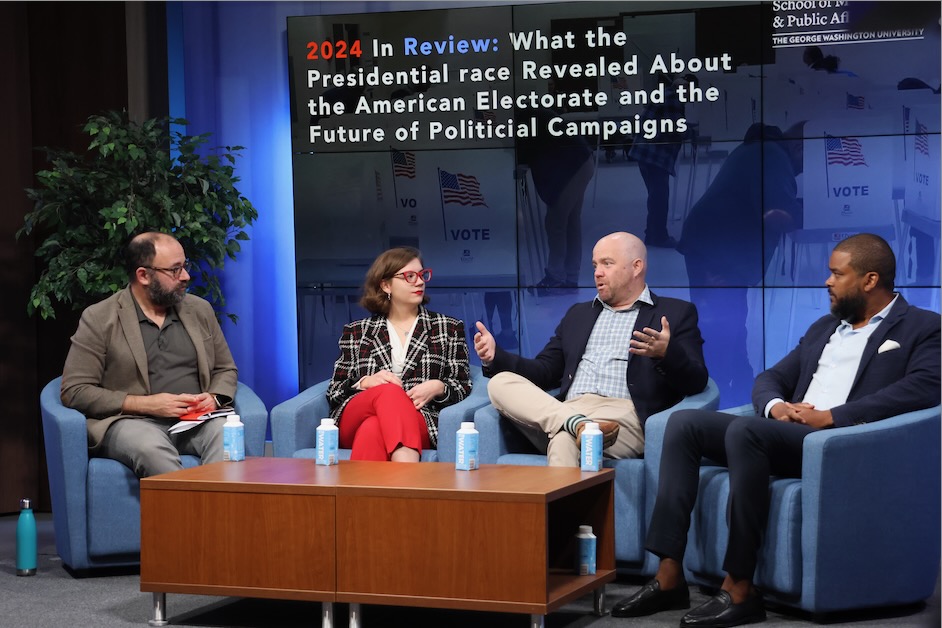This story originally appeared in GW Today.
Following the 2024 elections, people are grappling with what the results mean for the future of American politics.
A panel discussion, “2024 In Review: What the Presidential Contest Revealed about the American Electorate and the Future of Political Campaigns,” hosted by the George Washington University School of Media and Public Affairs (SMPA), examined how shifting dynamics of key voter demographics and the impact of economic issues impacted the election outcome.
Moderated by David Karpf, an associate professor of media and public affairs, the panel was the last of a three-part conversation series hosted by SMPA, in partnership with Campaigns & Elections. The panelists were Rodell Mollineau, co-founder and partner at Rokk Solutions, Jim Hobart, a partner at Public Opinion Strategies, and Abigail Brubaker, a senior studying journalism and mass communication at GW.
Karpf began by asking the panelists for their initial thoughts on the election results.
Hobart noted that the election outcome reflected a widespread national desire for change. “What we saw here was just an election where the entire country, for the most part, with a few exceptions, was just ready for something different,” Hobart said.
He drew parallels to similar trends seen in other countries that held elections in 2024, where incumbent parties struggled to maintain support. Hobart said this trend was a reflection that voters were upset and dissatisfied with the status quo.
Mollineau agreed, noting that the outcome was somewhat surprising, in part because certain demographics voted contrary to expectations, and issues that were believed to be decisive in influencing voters did not have the anticipated impact.
“At the end of the day, people were upset about inflation, they’re upset about rising costs. They wanted to be heard, and they made their voices heard at the ballot box,” Mollineau said.
He noted that Vice President Kamala Harris’ association with President Joe Biden hurt her campaign.
Mollineau highlighted key moments over the past four years of Biden’s term that led to him losing favorability with the American public.
He said Biden began losing support after the decision to withdraw from Afghanistan. Then voters grew upset by rising inflation and, despite reassurances from economists that prices would drop, as prices remained high, frustration only grew among voters.
Karpf asked how Harris’ candidacy being announced so close to Election Day impacted her chances.
“About 90 days before Election Day, we have a dramatic change. Now, with hindsight, do we have any notes on that choice, and how it played out? That was a dramatic moment,” Karpf said.
Brubaker said Harris did not have enough time to separate herself from the incumbent or to introduce herself to the American public.
"I think it was an interesting dynamic because we got a new top candidate with only a couple of months left in the election," Brubaker said. "A lot of people still saw Kamala Harris as Joe Biden—she was equated with the current administration, and she didn’t have enough time to distinguish herself or introduce herself to the public."
Hobart pointed out that Democrats lost ground in suburban areas, places that had gone to Biden in 2020 but swung toward Trump in this election.
“The halting of the suburban movement towards Democrats was surprising to me, and frankly, probably to the Harris campaign as well. That was kind of a bet they were making. To improve on those margins in those key states,” Hobart said.
Mollineau noted that Trump also surprisingly resonated with younger voters in this election, those ages 18 to 29, despite that demographic aligning with issues traditionally championed by Democrats, like climate change.
“You go back and look through some of the exit polling on these issues and these should have been Democrat voters but once again, economic anxiety,” Mollineau said. “I think that permeated, and they ended up voting for Trump. And the Democrats didn’t do a good enough job of reaching out to these folks.”
Brubaker shared similar sentiments and said the Democratic Party’s assumptions about certain demographics were overly simplistic.
“Many demographics aren’t monoliths,” Brubaker said. “You can’t say, because they support this one issue that they’ll automatically support your party.”
Mollineau concluded with a reflection on what he believes will mobilize and excite voters in future elections.
“The ability to find a candidate who can bring people together is more important than the policies,” Mollineau said. “Someone authentic. Voters don’t want someone who agrees with them on every single issue, people want someone who will stand up for them on the issues they care the most about, and someone authentic in the way that they talk to them.”


